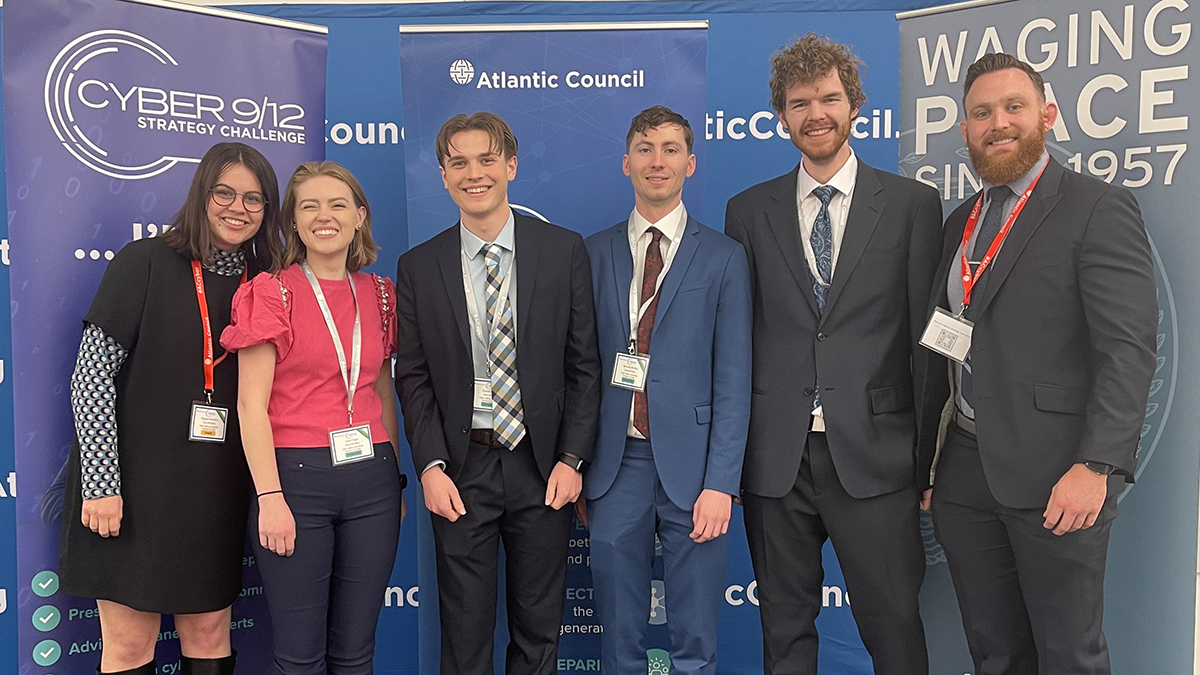Students from Utah Valley University’s (UVU) cybersecurity team, the “W0LV3R1NES,” placed second out of 43 prestigious university and military academy teams in the international Cyber 9/12 Strategy Challenge in Washington, D.C., March 15-16, 2024, sponsored by the Atlantic Council.

Students from Utah Valley University’s (UVU) cybersecurity team, the “W0LV3R1NES,” placed second out of 43 prestigious university and military academy teams in the international Cyber 9/12 Strategy Challenge in Washington, D.C., March 15-16, 2024, sponsored by the Atlantic Council.
The UVU team went head-to-head with master’s and doctorate students from Columbia University, New York University, Tufts University, Duke University, the United States Military Academy at West Point, the United States Air Force Academy, Air University (Air Education and Training Command), American University, University of Colorado, Arizona State University, six top international institutions, and private-sector teams.
Duke University placed first, with UVU a close second. The UVU team was the only full group of undergraduates in the competition. After the event, students briefed officials from the White House, the Central Intelligence Agency (CIA), the U.S. Department of Homeland Security, the U.S. Department of Defense, and top executives from companies like Cisco, CrowdStrike, and Siemens.
“Our team is scrappy, and we have a chip on our shoulder,” said Brandon Amacher, a coach and director of UVU’s Emerging Technology Policy Lab. “We know that we don’t necessarily have the same name recognition as some of the schools, but our students are willing to work twice as hard, research two or three levels deeper, and put an immense amount of time into perfecting the skills necessary to succeed.”
In the competition, the teams confronted a global real-world cybersecurity breach and presented recommendations to a board of industry and academic judges as the scenarios evolved. They justified their decision-making process while considering how the decisions would affect civilian populations, military, law enforcement, and private sector entities. The UVU team researched and practiced for months to prepare for the competition.
The UVU team members included Hope Fager, Camden Mead, Cooper Hopkin, and Nicholas Bradley, with an Intel Support Team including Amanda Tew, Maliq Rowe, Apollonia Perfetti, and Jake Huber. The UVU coaches were National Security Studies and Criminal Justice Professor Jonathan Rudd, Emerging Technology Policy Lab Director Brandon Amacher, and Center for National Security Studies alumna and Georgetown University graduate student Maggie Hutchens.
“Our team stayed up all night preparing their brief in the semifinal round of the competition,” said Amacher. “As you can imagine, this takes a toll. However, when the round started, the team snapped into what I can only describe as a ‘flow state.’”
Amacher went on to say, “Their presentation was unbelievably smooth, and you would never have guessed that they had only slept a couple of hours the night before. Their question-and-answer section was flawless, and I could tell the judges were supremely impressed. As a coach, I was very proud to see how well they handled a high-stress situation.”
UVU’s Center for National Security Studies is the premier national security program in the Intermountain Region of the U.S. It supports a number of student organizations like the W0LV3R1NES that allow students to gain valuable experience and bring national recognition to UVU. More information about the CNSS can be found at uvu.edu/nss.